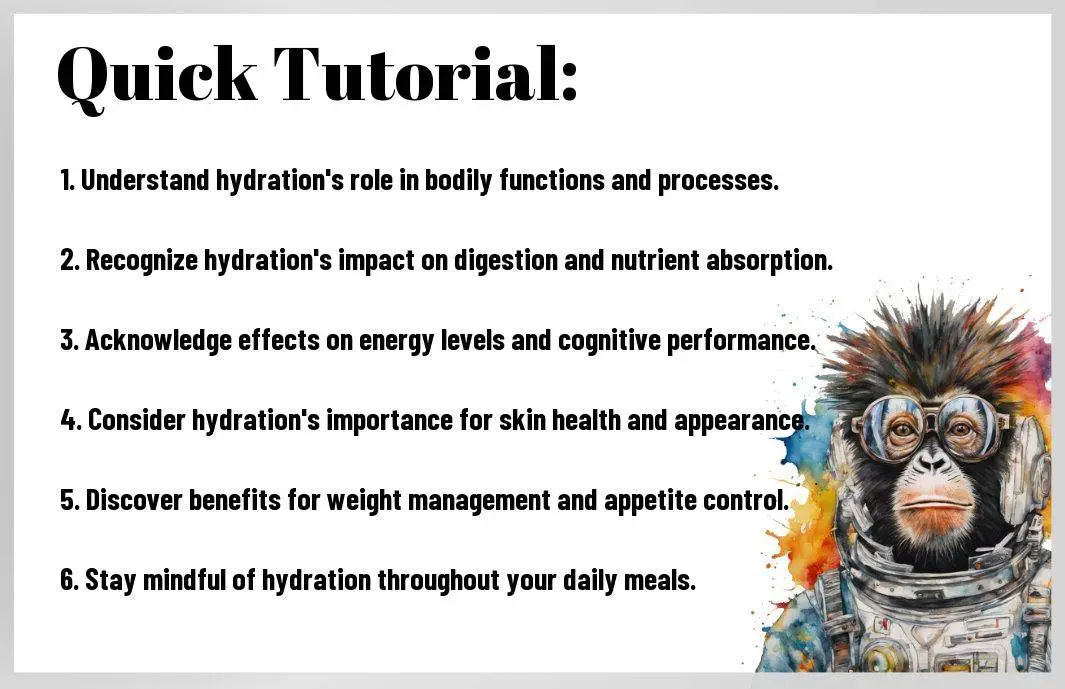Why Is Adequate Hydration Essential In Nutrition And Healthy Diets?
Inexorably tied to your overall health, hydration plays an indispensable role in nutrition and healthy diets. You may often overlook the importance of adequate water intake, but staying properly hydrated is vital for your body’s functions, energy levels, and mental clarity. This tutorial will probe into the myriad ways hydration impacts your health, discussing how it supports various bodily processes and enhances your diet. Understanding why water is fundamental to your nutrition will empower you to make more conscious choices for a healthier lifestyle.
The Role of Water in the Body
The human body relies heavily on water for various imperative functions. It acts as a solvent, transporting nutrients, regulating body temperature, and maintaining cellular health. Water also plays a vital role in waste elimination and maintaining blood volume, which is necessary for optimal organ function. Without adequate hydration, your body struggles to perform these tasks effectively, potentially impacting your overall health and well-being.
Cellular Function
Cellular health depends on optimal hydration levels. Water facilitates biochemical reactions within your cells, contributing to energy production and nutrient transport. When you are well-hydrated, your cells operate efficiently, enhancing metabolic processes and maintaining overall vitality.
Digestion and Nutrient Absorption
The digestive process requires adequate water to function smoothly. Water helps dissolve nutrients, making them easier for your body to absorb. Proper hydration ensures that your digestive system operates efficiently, promoting regular bowel movements and reducing the risk of constipation.
Role of water in digestion extends beyond simple absorption. It is imperative for producing saliva, which aids in breaking down food, and supports the digestive tract’s mucosal lining. Proper hydration can also prevent digestive discomfort and support healthy gut flora, ultimately contributing to a balanced and effective digestive process.

Hydration and Weight Management
One key aspect of weight management lies in maintaining proper hydration. When your body is adequately hydrated, it can more effectively regulate energy levels and metabolism, aiding in your efforts to manage weight. Moreover, drinking enough water can support your body’s physiological processes, ensuring that you stay energized and healthy while working towards your weight goals.
Appetite Regulation
On a daily basis, your body can easily confuse hunger with thirst. By staying hydrated, you can reduce the likelihood of unnecessary snacking and overeating. Drinking water before meals can help you feel fuller, which in turn can lead you to consume fewer calories, making it easier to adhere to your weight management plan.
Metabolism Boost
Weight management can also be enhanced through a well-hydrated metabolism. When you’re adequately hydrated, your body efficiently breaks down food and burns calories at an optimal rate. This means that drinking enough water can support your weight loss efforts by enhancing the efficiency of your metabolic processes.
A well-hydrated body promotes overall health by facilitating the breakdown of fats and carbohydrates for energy. When you’re properly hydrated, you can expect an increased resting energy expenditure, allowing you to burn more calories even when at rest. Moreover, hydration helps in the transportation of nutrients necessary for effective energy production, ensuring your metabolism operates smoothly and efficiently.
Hydration in Physical Performance
Keep in mind that hydration plays a vital role in optimizing your physical performance. Adequate fluid levels help regulate your body temperature, transport nutrients, and maintain joint lubrication. When you stay hydrated, you enhance your endurance and strength during workouts, allowing you to push your limits and achieve better results.
Endurance and Strength
Clearly, proper hydration is crucial for both endurance and strength training. Staying hydrated can significantly improve your stamina by delaying fatigue, enabling you to sustain a higher level of intensity. This ensures that your muscles receive the necessary oxygen and nutrients, supporting optimal performance and power throughout your workout routine.
Recovery and Injury Prevention
One of the often-overlooked benefits of hydration is its impact on recovery and injury prevention. Staying hydrated enables your body to efficiently repair muscles, transport nutrients, and remove waste products. This not only aids in quicker recovery times but also minimizes the risk of cramping and strains, helping you maintain consistent training without setbacks.
Physical hydration is vital for recovery because it supports cellular function and metabolic processes that are crucial for healing. When you are well-hydrated, your muscles can more effectively recover from the stress of physical activity, leading to reduced soreness and improved overall performance. Furthermore, adequate fluid intake can help to maintain joint health, which decreases the likelihood of injuries during workouts. Prioritizing proper hydration will help you stay in shape while minimizing disruptions to your fitness journey.
Common Signs of Dehydration
Not staying properly hydrated can lead to a variety of alarming signs that your body is sending you. You may experience symptoms such as dry mouth, fatigue, dark-colored urine, and dizziness. Being aware of these indicators is vital for maintaining your health and ensuring that you’re consuming adequate fluids throughout the day.
Physical Symptoms
There’s a range of physical symptoms that can manifest when you are dehydrated. You might find yourself feeling fatigued, experiencing headaches, or suffering from muscle cramps. Additionally, your skin may become less elastic, and you might even notice a decrease in your urine output. Staying attuned to these signs can help you quickly address your hydration needs.
Cognitive Effects
Any level of dehydration can lead to negative cognitive effects that impair your focus and decision-making skills. When you’re not hydrated, you might struggle with concentration, memory retention, and even your overall mood. This impact can hinder your ability to perform daily tasks efficiently, whether at work or at home.
Effects of dehydration on cognition can be particularly pronounced, as even mild dehydration can impair your brain function. You might notice increased feelings of anxiety and irritability, which can affect your productivity and interpersonal relationships. Proper hydration is not only vital for physical health but also necessary for maintaining optimal cognitive performance and emotional well-being.
Tips for Maintaining Adequate Hydration
To ensure you stay properly hydrated, consider these practical tips:
- Carry a reusable water bottle throughout the day.
- Set reminders on your phone to drink water regularly.
- Flavor your water with slices of fruit or herbs for variety.
- Incorporate hydrating foods like cucumbers and oranges into your meals.
Assume that by following these strategies, you will find it easier to meet your hydration goals.
Daily Water Intake Recommendations
There’s a common guideline suggesting that you should drink about eight 8-ounce glasses of water daily, known as the “8×8 rule.” However, your individual needs can vary depending on factors like age, activity level, and climate. Aim to listen to your body’s thirst signals and adjust your intake accordingly.
Hydration Sources Beyond Water
An effective hydration strategy includes more than just drinking water. You can get fluids from various beverages and foods, contributing significantly to your daily hydration needs.
Adequate hydration can also come from beverages like herbal teas, coconut water, and even coffee in moderation. Many fruits and vegetables have high water content, with options like watermelon, strawberries, and lettuce being excellent choices. Incorporating these foods into your diet is a delicious way to boost your fluid intake while enjoying diverse flavors and nutrients.
Relationship Between Hydration and Overall Health
Many underestimate the role hydration plays in maintaining your overall health. Adequate water intake supports numerous bodily functions, including circulation, digestion, and temperature regulation. When you are well-hydrated, your body can efficiently transport nutrients, remove waste, and maintain energy levels, all of which contribute to your well-being. Fostering good hydration habits can lead to improved physical performance and mental clarity, making it a foundational element of a balanced diet.
Disease Prevention
Between proper hydration and disease prevention, there is a significant connection. Staying hydrated helps your immune system function optimally, allowing your body to combat infections and illnesses more effectively. In addition, adequate water intake can reduce your risk of chronic conditions such as kidney stones and urinary tract infections, further highlighting the protective role hydration plays in your health.
Skin Health and Aging
Overall, effective hydration is necessary for maintaining vibrant skin and slowing down the aging process. When you ensure your body receives enough water, your skin remains plump and elastic, reducing the appearance of fine lines and wrinkles. Hydration also supports the skin’s natural barrier, helping it retain moisture and defend against environmental stressors that can accelerate aging. You may notice that those who prioritize hydration often enjoy a more youthful complexion.
Another aspect of skin health impacted by hydration is its role in promoting blood flow and nutrient delivery to skin cells. Adequate hydration aids in the elimination of toxins, enhancing your skin’s overall appearance and texture. Moreover, when you prioritize drinking enough water, you may find that your skin remains less prone to dryness and irritation, allowing you to reveal a more radiant and healthy complexion with age.
To wrap up
To wrap up, adequate hydration is fundamental to your nutrition and overall health. It aids in digestion, supports nutrient absorption, and helps regulate body temperature. By maintaining proper fluid levels, you can enhance your physical performance and cognitive function. Prioritizing hydration not only improves your daily energy levels but also contributes to the prevention of various health issues. Therefore, ensuring you drink enough water throughout the day is crucial for promoting your well-being and supporting your dietary goals.
